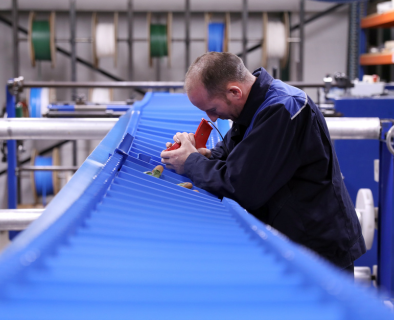Building resilience and fuelling growth: Lessons from GB Belting

17th Feb 2025
David Smith from GB Belting: their culture, business approach, and dedication to innovation are notable.
What stands out most is their ability to build resilience through diversification. GB Belting serves multiple industries, each with its unique demands, and they do it in a way that maximises efficiency, maintains service excellence, and ensures long-term sustainability. It’s an approach that has allowed them to thrive through market fluctuations and holds valuable lessons for business leaders and policymakers alike.
Not having all your eggs in one basket
One of the most impressive aspects of GB Belting’s model is its market spread. They manufacture conveyor belts from treadmill machines to food processing lines and waste recycling facilities. Each market requires a different approach, and GB Belting has finetuned its operations to serve them all effectively.
As David explained:
“Because of what we do, we work in a lot of industries. We supplied our 100th country last year. The automotive sector is down a bit at the moment, but the recycling industry is growing, and we’ve got new materials to meet that demand. The leisure industry peaked during COVID, but as that’s slowed, other sectors have picked up.”
This ability to shift focus between markets keeps the business agile and resilient.
For example, in the leisure sector, they manufacture treadmill belts and sell them almost entirely through e-commerce. Customers simply enter the make and model of their treadmill, place an order, and track delivery. It’s a low touch, high efficiency model, tailored to customer preferences and market needs.
“We’re on 18 different Amazon sites worldwide. If you have a treadmill that’s 20 years old, we can make a belt for it because we know the sizes and details. The aim is for it to be fully automated, customers input their machine details, and we get the order straight onto the factory floor, manufacture the belt, pack it, and ship it out.”
Contrast that with their work in the food & drink and waste & recycling sectors, where businesses require bespoke conveyor belt solutions. In these markets, GB Belting works closely with OEMs and end users, designing and engineering tailored belt solutions that meet industry specific regulations and performance demands. These relationships are far more collaborative and long-term, built on trust, expertise, and innovation.
“If you're talking to an end-user in the food industry, for example, they have very customised production lines. We work with the OEMs to ensure the belts meet food safety standards, are easy to clean, and allow for efficient maintenance. It’s a totally different process compared to selling treadmill belts online.”
Resilience in action – thriving in a VUCA (Volatile, Uncertain, Complex, Ambiguous) world!
GB Belting’s multi-market approach gives them a natural buffer against market fluctuations.
Automotive sector slowdown? No problem, the demand for conveyor belts in recycling is rising due to sustainability initiatives.
COVID-19 lockdowns? When manufacturing paused, treadmill belt sales skyrocketed as people invested in home gym equipment.
Market downturn in one sector? Another market picks up the slack.
“During COVID, we were selling three to four times the number of treadmill belts we usually sell. Everyone was working out at home! Now that’s slowed down, but we’re seeing an increase in demand in the recycling and food industries. We’re never reliant on just one sector.”
This ability to rebalance and pivot means they don’t just survive disruptions; they are built to thrive in a volatile world.
A Lesson for businesses (and policy makers!)
GB Belting’s success story isn’t just inspiring, it’s a blueprint for building more resilient businesses and a stronger economy.
For business leaders, their approach is a reminder that over reliance on a single market, customer base, or business model creates risk. Expanding into new sectors while maintaining tailored approaches for each can provide long term growth and stability.
“We don’t just sell belts, we solve problems for our customers. Whether it’s reducing downtime for a food production line or making sure someone’s treadmill at home is working, we adapt our approach to different markets.”
For policy makers, this highlights why supporting businesses to diversify and explore new markets is critical. The RTC North supply chain initiatives have already helped hundreds of businesses like GB Belting to identify new opportunities, conduct market research, and forge valuable industry connections. We need more of this type of support to future proof businesses.
“Through the Tees Valley Supply Chain Programme, we’ve had access to market research, industry events, and networking opportunities. It’s helped us identify new markets and form partnerships that have been really valuable for our business.”
If GB Belting’s approach has sparked ideas about how your business can diversify, break into new markets, or build resilience, RTC North is here to help. Whether you need market research, industry connections, or strategic advice, we can support you in scaling your business while reducing risk.
Want to strengthen your business or explore new markets? Get in touch today.
Let’s future proof your business and fuel your growth.
